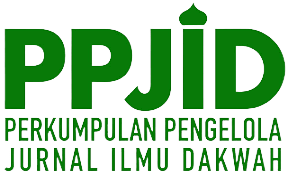Ecological Da’wa as an Alternative for Development Communication
DOI:
https://doi.org/10.18196/jicc.v2i1.26Keywords:
Da’wa, Environmental, Ecology, Communication, DevelopmentAbstract
Environmental issues occurred from the end of the 20th century until the second decade of the 21st century. Environmental issues such as the climate crisis, global warming, and exploitation of natural resources are separate problems in human development. The development required a public participatory process so that the development comes can run effectively and efficiently, especially development based on an ecological perspective. Indonesia, with the largest Muslim population in the world, has the potential to support a development process based on an environmental perspective. Islam, by the Al-Qur’an as the base of guiding, contains ecological values that need to be transformed for Muslims. The process of transforming the values of Islamic guidance, or da’wa, allows for the transformation of Islamic values, especially ecological values, which are then referred to as ecological da’wa. In ecological da’wa, the process and end goal can be an alternative development communication to create a sustainable living environment and make the community achieve sustainable and harmonious prosperity and welfare.
References
Amin, S. M. (2021). Ilmu dakwah. Amzah.
Aziz, M. A. (2019). Ilmu Dakwah: Edisi Revisi. Prenada Media.
Fata, A. K. (2017). Basis Teologis Dakwah Ekologis. Jurnal Bimas Islam, 10(2), 375-401. https://doi.org/10.37302/jbi.v10i2.28.
Fata, A. K. (2014). Teologi lingkungan hidup dalam perspektif Islam. Ulul Albab Jurnal Studi Islam, 15(2), 131-147. https://doi.org/10.18860/ua.v15i2.2666.
Ife, J., & Tesoriero, F. (2016). Community Development: Alternatif Pengembangan Masyarakat di Era Globalisasi. Pustaka Pelajar.
Jenatsch, T., & Bauer, R. (2016). Communication for Development a Practical Guide. Swiss Agency for Development and Cooperation (SDC). https://doc.rero.ch/record/277647/files/03-COS_Manual_EN_160616_web.pdf.
Junaedi, F. (2019). Etika Komunikasi di Era Siber. Rajawali Press.
Junaidi, M. (2017). Komunikasi Qur’ani. DAR EL-ILMI: Jurnal Studi Keagamaan, Pendidikan dan Humaniora, 4(2), 25-48. http://e-jurnal.unisda.ac.id/index.php/dar/article/view/651.
Khalid, K. (2021). Darurat Ekologis. Walhi. https://www.walhi.or.id/darurat-ekologis.
Littlejohn, S., Foss, K. (2009). Encyclopedia of Communication Theory. Sage Publication, Inc. https://books.google.co.id/books?hl=id&lr=&id=S8Kf0N0XALIC&oi=fnd&pg=PP1&dq=Encyclopedia+of+Communication+Theory&ots=doLsVjFfqW&sig=D24JO6zea0WrvhvpcbR7vTj8hTo&redir_esc=y#v=onepage&q=Encyclopedia%20of%20Communication%20Theory&f=false.
Pirol, A. (2017). Komunikasi dan Dakwah Islam. Deepublish.
Subejo. (2021). Isu, Trend, dan Perubahan Paradigma Komunikasi Pembangunan di Indonesia. InPress.
Suriani, J. (2018). Komunikasi dakwah di era cyber. An-Nida', 42(1), 30-51. http://dx.doi.org/10.24014/an-nida.v42i1.9337.
Ulfa, G. S., & Fatchiya, A. (2018). Efektivitas instagram “Earth Hour Bogor” sebagai media kampanye lingkungan. Jurnal Komunikasi Pembangunan, 16(1), 144-157. Melalui Strategi Komunikasi. Prenada Media. https://doi.org/10.46937/16201825129.
Zubaedi. (2013). Pengembangan Masyarakat: Wacana dan Praktik. Penerbit Kencana.
Downloads
Published
How to Cite
Issue
Section
Categories
License
Copyright (c) 2023 Journal of Islamic Communication and Counseling

This work is licensed under a Creative Commons Attribution-NonCommercial-ShareAlike 4.0 International License.
Journal of Islamic Communication and Counseling is currently licensed under a Creative Commons Attribution-ShareAlike 4.0 International (CC BY-SA 4.0)





